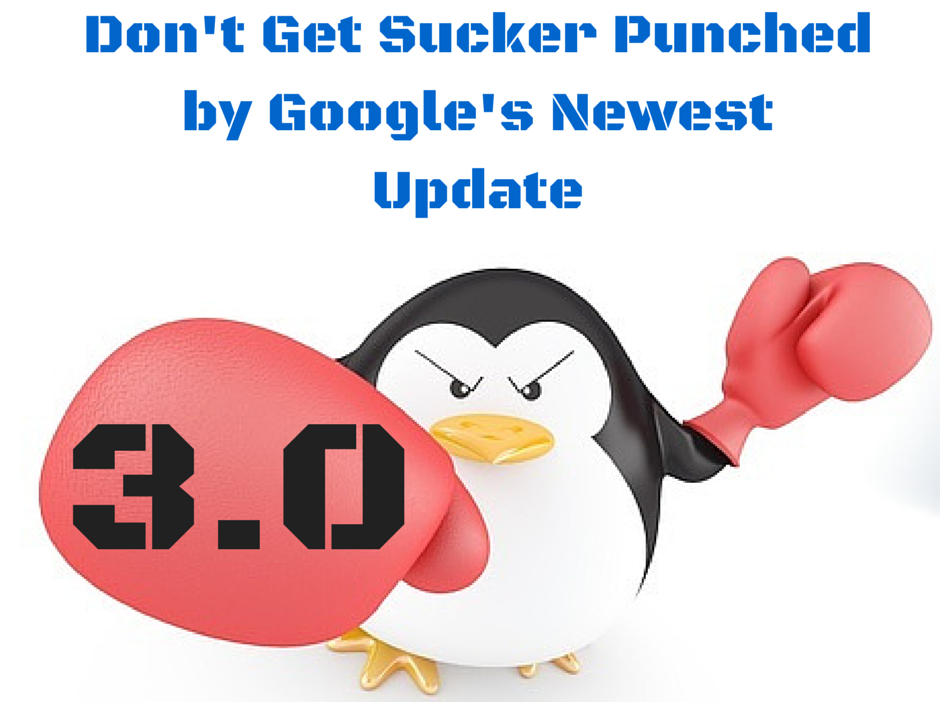
Google became the number one search engine in the world because of its drive to deliver excellent search results. This desire to quickly give users what they want continues, and Google keeps making improvements to their search results – by ongoing updates to its algorithm.
Different updates types focus on different aspects of the search results. The most well-known update types are Penguin (with two updates so far), Panda (over 26 updates) and Hummingbird (one update).
There’s a significant update that has officially launched: Penguin 3.0. The last Penguin update was almost a year ago, and the tension is mounting as webmasters and SEO experts all over the world scramble to get ready.
For sites that have been doing their SEO and link building according to Google’s standards, this is good news. The new update won’t pose any problems, and may even result in a rise in ranking.
However, for those companies that haven’t kept up with what Google is doing and what it frowns upon, the update can result in lower traffic, less sales and a shocking decrease in revenue.
Penguin’s Focus: Your Site’s Inbound Links
Like all Google updates, Penguin’s goal is to penalize sites that are spamming the search engine results. But specifically, Penguin focuses on sites that artificially inflate the number and quality of their inbound links.
Remember: Google’s goal is to list authentic, sites in their results pages that have value to visitors in terms of useful content. It wants to downplay sites that aren’t getting inbound links the natural way – by providing useful and compelling content that draws attention (and links) in a natural way.
It takes time and energy to create quality content that attracts links. So the temptation is there to take “shortcuts”, which Google describes as link schemes.
Link schemes include paid links plus other types of artificial links, and Penguin updates are designed specifically to detect them and de-value sites that have them.
Penguin Happens Occasionally and with Full Force
Penguin is unique. It doesn’t come into play in regular and gradual “refreshes”, like other updates do. Penguin updates are performed infrequently, and “all at once”; thus they are likely to have stronger effects when they do happen.
Google’s Matt Cut has warned, in a comment to a blog post by Barry Shwartz: “… expect that the next few Penguin updates will take longer, incorporate additional signals, and as a result will have more noticeable impact.”
There’s a positive note to this “long time between updates” aspect of Penguin. If your site was penalized by the last Penguin update, and you’ve worked diligently to clean up your links since then, your site is likely to get a bump up in rankings and a significant increase in traffic due to the Penguin 3.0 release.
Which Links Are Bad Links?
Some examples of the type of links you’ll want to (and hopefully already did) eliminate are: Paid links to your site. Excessive links from “link exchanges”. Unnatural links such as low-quality directory site links, bookmark site links, or over-optimized forum signatures. To get a detailed explanation of which links Penguin will look upon unfavorably, read Google’s guidelines on link schemes.
 Do a Link Audit Before it’s too late
Do a Link Audit Before it’s too late
The best way to prepare for the Penguin 3.0 Update is to do a link audit – a full review of your inbound links – and clean out any that look suspicious.
Google’s free Webmaster Tools lets you check out your links, but as it only provides a sampling, you’ll need a more robust backlink checker to do the job. Some examples of popular backlink tools are SEOMoz and Majestic SEO.
From SEO Roundtable: Penguin 3.0 Recap from SEO Roundtable based off of the update from Pierre Far
Penguin started rolling out late Friday night, October 17th
It will continue to roll out for next few weeks
It is a worldwide roll out
It will impact less than 1% of English queries
It is only a refresh, no new signals added
In the next post, we’ll give you some detailed tips on how to conduct a good link audit.

Comments